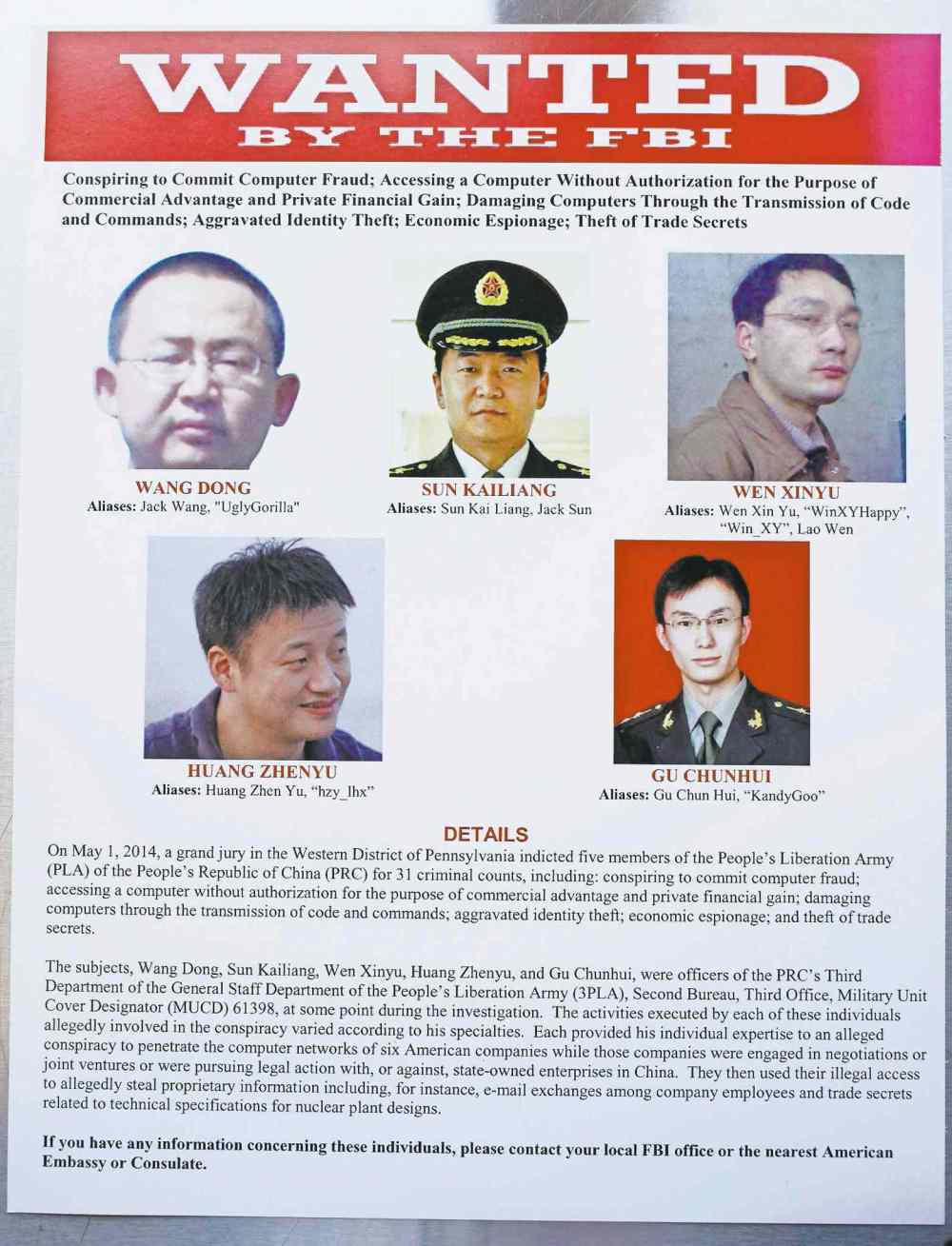U.S. files charges against Chinese military hackers
Economic-espionage accusation first against foreign officials
Advertisement
Read this article for free:
or
Already have an account? Log in here »
To continue reading, please subscribe:
Monthly Digital Subscription
$0 for the first 4 weeks*
- Enjoy unlimited reading on winnipegfreepress.com
- Read the E-Edition, our digital replica newspaper
- Access News Break, our award-winning app
- Play interactive puzzles
*No charge for 4 weeks then price increases to the regular rate of $19.00 plus GST every four weeks. Offer available to new and qualified returning subscribers only. Cancel any time.
Monthly Digital Subscription
$4.75/week*
- Enjoy unlimited reading on winnipegfreepress.com
- Read the E-Edition, our digital replica newspaper
- Access News Break, our award-winning app
- Play interactive puzzles
*Billed as $19 plus GST every four weeks. Cancel any time.
To continue reading, please subscribe:
Add Free Press access to your Brandon Sun subscription for only an additional
$1 for the first 4 weeks*
*Your next subscription payment will increase by $1.00 and you will be charged $16.99 plus GST for four weeks. After four weeks, your payment will increase to $23.99 plus GST every four weeks.
Read unlimited articles for free today:
or
Already have an account? Log in here »
Hey there, time traveller!
This article was published 20/05/2014 (4202 days ago), so information in it may no longer be current.
WASHINGTON — The U.S. Justice Department Monday filed unprecedented criminal charges against five members of the Chinese military, accusing them of economic espionage for hacking into the computers of U.S. companies involved in nuclear energy, steel manufacturing and solar energy.
The indictment for economic espionage marked the first such case brought against foreign government officials and was seen by some analysts as important symbolically.
U.S. Attorney General Eric H. Holder Jr. said at a news conference the hacked American companies and organizations included U.S. Steel, Westinghouse, Alcoa, Allegheny Technologies, the United Steel Workers Union and U.S. subsidiaries of SolarWorld, a German company.

Holder said in some cases, the five Chinese officers stole trade secrets and in other cases they stole “sensitive, internal communications” that provided Chinese companies with valuable information on the strategies or vulnerabilities of U.S. competitors with whom the Chinese were negotiating.
Kathleen Walsh, an associate professor at the Naval War College, said the indictment underscores key differences in the viewpoints of the two influential nations.
The U.S. has historically considered it a crime to spy on private firms in order to provide commercial advantage, she said. In contrast, China’s technology-development strategy embraces all forms of technology transfer, including espionage and cyber-espionage.
“Therefore, this indictment is unlikely to fundamentally change China’s long-standing technology-development strategy and cyber-espionage activities,” said Walsh, who stressed her analysis did not represent the official views of the U.S. government or the military. “It does, nonetheless, raise the costs somewhat, if mainly in diplomatic terms and as a loss of global face.”
The indictment included the five officers’ names, their unit, their photographs and the building in Shanghai where they work. But there is little prospect of them ever being brought to justice in the U.S., officials said.
Instead, the indictment appeared to be intended to send a message to Chinese leaders, who have denied the People’s Liberation Army is engaged in economic espionage and have challenged the U.S. to provide proof.
“Well today, we are” providing proof, said assistant attorney general for national security John Carlin. “For the first time, we are exposing the faces and names behind the keyboards in Shanghai used to steal from American businesses.”
“This indictment describes, with particularity, specific actions on specific days by specific actors to use their computers to steal information from across our economy,” Carlin said. “This administration will not tolerate actions by any nation that seeks to illegally sabotage American companies and undermine the integrity of fair competition in the operation of the free market,” Holder said at the news conference in Washington.
“This case should serve as a wake-up call to the seriousness of the ongoing cyber threat,” he said.
The officers — identified as Wang Dong, Sun Kailiang, Wen Xinyu, Huang Zhenyu, and Gu Chunhui — were officers in Unit 61398 of the Third Department of the Chinese People’s Liberation Army.
In another case, prosecutors in New York were expected to announce Monday some arrests abroad and other enforcement actions involving “malicious” compromising of computer software, according to a law enforcement official familiar with the case.
The charges are certain to heighten tensions between the U.S. and China. Each side has accused the other of cyber-spying. In 2013, the U.S. information security firm Mandiant said that a unit of the People’s Liberation Army had been linked to cyber-intrusions of 141 U.S. and foreign companies and entities, mostly in English-speaking countries.
— Tribune Washington Bureau

